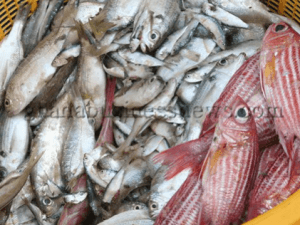Removal of EU fish export ban on Ghana should lead to enforcing laws
 In the last week, the European Union (EU) removed a three-year ban it imposed on fish exports from Ghana. Ghana was sanctioned when the country failed to reform its fisheries sector after it was warned and urged to deal with the issues of illegal, unreported and unregulated (IUU) fishing.
In the last week, the European Union (EU) removed a three-year ban it imposed on fish exports from Ghana. Ghana was sanctioned when the country failed to reform its fisheries sector after it was warned and urged to deal with the issues of illegal, unreported and unregulated (IUU) fishing.
The EU gave Ghana a ‘yellow card’, effectively banning fish exports from Ghana into the 28-nation trade bloc.
The EU on removing the ban said it did so because the country”significantly reformed” the way they run their fisheries.
“Both Ghana and Papua New Guinea have taken ownership of their fisheries reforms and now have robust legal and policy frameworks in place to fight IUU fishing activities,” the EU Fisheries Commissioner Karmenu Vella was quoted saying in a statement.
A GNA report cites the Minister of Fisheries, Sherry Ayittey saying the country lost about $150 million during the three years ban.
The announcement of the lifting of the ban therefore, did not only bring relief to the country’s fish exports sector, but the added economic gains for a country struggling to address its widening trade deficits.
Some studies show that Ghana’s total export from fish and fishery products amounted to nearly $96 million in 2002. Average annual exports have increased more than 500 per cent since the 1960. The export destination for fish from Ghana is mainly EU countries such as Spain, Portugal and Greece; the USA and Japan. Fish exports from Ghana are made up of high value tuna (whole, loins and canned), frozen fish (mostly demersal species), shrimps, lobsters, cuttlefish and dried and smoked fish.
For instance about 10 years ago, the total tuna export from Ghana was 55,343 metric tonnes with an estimated value of $50 million.
However, illegal fishing and over exploitation in Ghana’s waters is affecting the fisheries sector, which is reported to contribute about five per cent of GDP.
Majority of Ghana’s fishers are small scale.
A 2001 study of the industry shows that nearly 10,000 dugout canoes and about 124,000 fishermen with nearly 1.5 million dependents operate from 334 landing centres in 195 fishing villages along the marine coast.
The study indicates that the fleet is responsible for over 80 per cent of the total annual catch of small pelagic fish species (sardinella, mackerels and anchovies).
According to a 2004 report by the FAO the artisanal landing sites are estimated to have accounted for 200,769 metric tonnes of fish, equivalent to 69 per cent of total marine fish output in 2002.
Semi industrial fleet is made up of about 348 vessels, ranging in size between 8 m and 37 m long, which operate both as trawlers and purse.
The GNA report citing a stakeholders engagement in Tema in July, said it was reported that the total landings of small pelagic (anchovies, sardinellas, mackerels and horse mackerel) have decreased from 277,000 metric tons in 1996 to about 92,000 metric tons in 2011.
The Fisheries Ministry is on record to have said fisheries sector legislative reform will, among other things, impose severe sanctions on IUU fishers and repeat offenders. It will also include the introduction of new control measures on Ghana-flagged vessels that intend to fish in neighbouring countries.
Hopefully, the law would be enforced to save the coubtry further embarrassment and economic losses.
By Emmanuel K. Dogbevi
Copyright © 2015 by Creative Imaginations Publicity
All rights reserved. This article or any portion thereof may not be reproduced or used in any manner whatsoever without the express written permission of the publisher except for the use of brief quotations in reviews.
